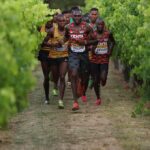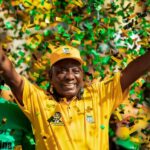Senegal’s opposition candidate Bassirou Diomaye Faye has been announced as the winner last Sunday’s election with 54.28% of the total votes, official provisional results released by the electoral commission on Wednesday confirms.
Following the release, presidential candidates have until the end of Thursday to file appeals challenging Mr Faye’s win, failure to which the Constitutional Council will confirm him as the president-elect.
Mr Faye’s main challenger, former Prime Minister Amadou Ba of the ruling coalition, secured 35.79% of total votes.
The election recorded a voter turnout of 61%.
Mr Ba, along with several of the other 15 presidential contestants, have already conceded and congratulated Mr Faye. It is considered unlikely that they will appeal against the results.
Mr Faye has said he will rule Senegal with humility and fight corruption.
He has also promised to put measures in place to address youth unemployment and the high cost of living.
Expectations remain high for Africa’s youngest democratically elected president.
Before the official announcement by the electoral body, the outgoing president, Macky Sall had already congratulated the opposition leader say: “I salute the smooth running of the presidential election of March 24, 2024 and congratulate the winner, Mr. Bassirou Diomaye Faye, who the trends show as the winner.”
“It is the victory of Senegalese democracy”, he posted on his X page.
ECOWAS has commended Senegal electoral officials for exhibiting “remarkable professionalism” in a peaceful environment during the polls.
The ECOWAS Commission’s election observers in its preliminary report said: “Generally, all the 57 polling stations visited at the start of the poll opened within half an hour of the official opening time of 08:00 am. No significant delays were recorded at the start of the poll, as voting materials and polling agents arrived ahead of the opening of the poll.”
According to the Mission the polling process generally proceeded smoothly and in a largely peaceful atmosphere.
It said: “Eligible voters were able to freely exercise their franchise without hinderance, even though there were some polling stations (28.13%) which were not easily accessible to physically challenged persons, particularly the aged and persons living with disabilities (PWDs).”









